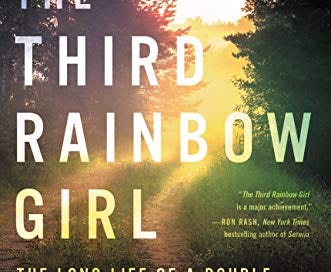You're a Podcast Fan (Or Not)
Recommendations for fans of You're Wrong About, Floodlines and Wind of Change
Hi book lovers,
Since it’s now dark by 4:30 each day in D.C., I’m struggling to do anything but stay in bed and read. Or stay in bed and listen to an audiobook. The good news is the days start getting longer in a week. So, soon, I’ll be sitting outside with a book.
I’ve decided to mix things up a bit with this week’s recommendations. A number of you have reached out looking for book recommendations based on your favorite podcasts, so this week I have three books connected to three of the year’s best podcasts. If you’re not a podcast listener, don’t fear. These are great books that stand alone, and you might find a podcast that you want to try.
So, what to read if …
You’re Obsessed with You’re Wrong About
The Third Rainbow Girl by Emma Eisenberg
New York magazine recently called You’re Wrong About “a show that you keep around as a sort of secret, only to look up not long after to hear everybody else positively humming about it.” In each episode, writers Michael Hobbes and Sarah Marshall deconstruct the established narrative around historical events ranging from the O.J. Simpson trial to the satanic panic. Hobbes and Marshall focus as much on how we come to accept an established narrative as they do on the facts of an individual case, carefully examining cultural forces and media expectations. They show passion — and compassion — for their subjects.
If you’re looking for a book with a similar vibe, I cannot recommend Emma Eisenberg’s The Third Rainbow Girl enough. Part true crime, part memoir, it explores the fallout of a double murder in Pocahontas County, West Virginia in 1980 and Eisenberg’s time in the county thirty years later. She documents not just the subsequent criminal trials but how true crime stories are written. She attempts to understand her obsession with the case and society’s obsession with “missing white woman syndrome.”
Fans of You’re Wrong About will find the book’s tone and feel similar to the show (Eisenberg even references Marshall on page four), and non-fans will enjoy Eisenberg’s lyrical writing and coming of age story.
Bonus Rec: If you want a book that further explores our culture’s obsession with true crime, check out Unspeakable Acts: True Tales of Crime, Murder, Deceit & Obsession. This essay collection, edited by Sarah Weinmann, featuring essays from some of today’s best crime writers, including Sarah Marshall and Emma Eisenberg, as well as Michelle Dean and Pamela Colloff. Each of the pieces made me think and reconsider my obsession with the true crime genre.
You Binged Floodlines
Five Days at Memorial by Sheri Fink
First off, if you haven’t listened to Floodlines, The Atlantic’s recent podcast (or “audio documentary” if you’re fancy) about the aftermath of Hurricane Katrina, do it. The show carefully documents the government’s botched response to the disaster and the long-term trauma caused by the hurricane.
Five Days at Memorial focuses on a specific aspect of Hurricane Katrina — the response at New Orleans’ Memorial Hospital from August 28 to September 1, 2005, as the storm ravaged the city.
Pulitzer Prize-winning reporter Sherry Fink spent two years investigating the hospital staff’s decision to give lethal injections of morphine to patients they believed wouldn’t survive the crisis. Fink is such a talented writer that I found myself sympathizing with the doctors who euthanized patients even as I found their actions abhorrent.
As hospitals nationwide struggle with a lack of resources during the coronavirus epidemic, I’ve found myself reflecting on Five Days at Memorial a lot. Full warning: This is obviously not a light or easy read, especially right now, but I think it’s an important one.
You Loved Wind of Change
The Secrets We Kept by Lara Prescott
Winds of Change is one of the weirdest podcasts I’ve listened to in years — in a good way. Host and reporter Patrick Radden Keefe (who coincidentally wrote the forward to Unspeakable Acts) investigates a rumor he heard years ago — that the CIA secretly wrote a rock song for The Scorpions, a German rock band, at the peak of the Cold War. In between segments on the Scorpions and the Cold War, Keefe dives into the history of the CIA using art and literature as part of their effort to build support for American interests abroad, such as Louis Armstrong’s CIA-sponsored trip to Africa.
In The Secrets We Kept, Lara Preston fictionalizes the real-life CIA operation to distribute Boris Pasternak’s legendary novel, Dr. Zhivago, in the Soviet Union. The book alternates perspectives between Irina, a young Russian-American spy, and Olga Ivinskaya, Pasternak’s mistress, showing how both women drown under the weight of the secrets they keep. This book, which incorporates aspects of both a love story and a spy thriller, is both a super-fast read and a chilling account of life in the Soviet Union.
The best endorsement I have of this book is that I gave it to my former academic adviser, who spent years in the Soviet Union, and she loved it.





